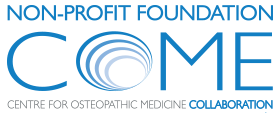
Friday 18th October 2019
Please note that: the Program of the Conference is not complete and may be subject to change
The Conference will be held in English language with translation into Italian language.
09:00-13:00 morning session
ALLOSTATIC APPLIED THEORY
- Alessandro Rapisarda – Docente CSDOI Catania
- Presidente ROI: Paola Sciomachen
- Presidente AISO – associazione Italiana scuole di osteopatia – Gina Barlafante
14:30 - 18:00 Afternoon session
Workshop Parallel Session
14:30-16:00
1st workshop session
- “Cerebral perfusion changes after osteopathic manipulative treatment in asymptomatic volunteers: a randomized manual placebo-controlled trial” Marco Tramontano
- “Tissue allostasis, how to measure change: the use of the durometer in osteopathic clinical practice” Andrea Buscemi
- “Effects of osteopathic treatment on somatosensory deficit in the elderly: a randomized controlled trial” Anaëlle Reulet
- “What makes an osteopathic treatment “effective” in patients’ perspective: a descriptive phenomenological study”Giacomo Consorti
- “A New Perspective for Somatic Dysfunction in Osteopathy: the Variability Model” Andrea Bregna
16:00 - 16:30 Coffee Break
16:30 - 18:00
2nd workshop session
Osteopaths have developed traditional skills and knowledge appreciated by patients but not always recognised by the osteopaths themselves. Education and research often focus on osteopathic manipulative treatment itself without always acknowledging other important components of care. Advances in research however suggests that an important part of benefits from osteopathic care can arise from movement in the absence of pain, enhancing self-confidence, positive reinforcement, and increasing awareness. This workshop aims to explore some of these principles and open the discussion on how best to integrate and explore them in clinical practice and research.
GALA DINNER
The Gala dinner is scheduled for Friday, October 18, 2019 is open to all participants and it will be held at the Restaurant of the Grand Hotel Baia Verde – Catania.
The cost of the dinner is € 50.00 to be paid upon registration.
Saturday 19 October 2019
08:30-13:00 morning session
CLINICAL APPLICATION OF ALLOSTATIC CONCEPTS
14:30 - 18:00 Afternoon session
Workshop Parallel Session
14:30-16:00
1st workshop session
- “Cranial versus local osteopathic techniques on diaphragmatic motion: David against Goliath?” Damiana Mancini
- “Does the allostatic load affect body oscillations? Recognizing the dysfunctional sphere” Andrea Buscemi
- “Effects of osteopathic treatment versus static touch on heart rate and oxygen saturation in premature babies: a randomized controlled trial” Andrea Manzotti
- “Chronicisation risk of low back pain patients : an osteopaths’ assessment” Wagner Agathe
- “Which strategies to osteopaths in the prevention of sedentary lifestyle?” Ronan Vitali
16:00 - 16:30 Coffee Break
16:30 - 17:15
2nd workshop session
These workshops will be independently chosen at conference site. This session will provide updates regarding the activities of National CEntre (NACE) of the Non-profit Foundation C.O.ME. Collaboration.







